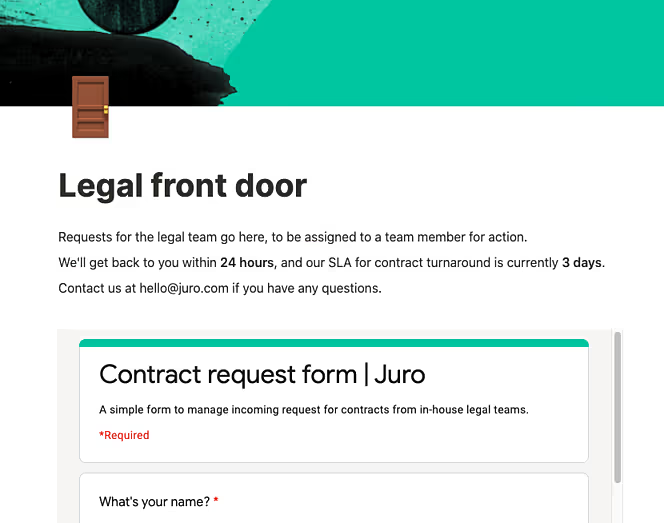Solutions
Customer Support
Resources
It’s no secret that a majority in-house lawyers feel buried in low-value work - that was one of the key findings of our Tech GC report. As sole counsel, or the leader of a lean team supporting a company that’s scaling fast, the sheer volume of tasks can quickly become overwhelming.
Chief amongst that low-value work is the merciless onslaught of contract requests. GCs often turn to self-serve automation platforms initially to try and head off the daily churn of emails, Slack messages and phone calls about non-disclosure agreements, sales contracts, partner agreements, and so on.
An in-house lawyer is an extremely expensive resource to be deploying on digging out Word documents and PDFs from shared drives and sending them around. What makes it worse is when the query is vague, or missing information, making it even harder for the legal team to find and share the appropriate contract.
One of the best ways to improve this process is by setting up a self-serve workflow using contract automation, which you can do by hitting the button below.

But If you’re not quite ready yet for self-serve contracts from automated templates, a quick hack to at least partly alleviate this problem is to set up a contract request form to manage incoming requests. Keep reading to find out how.
A contract request form is a data capture mechanism that enables colleagues to make detailed requests for legal documents from the legal team, in a way that’s standardized and centralized.
Below is a simple form we've created to help you achieve this. Upon completion, it would send an email to the form owner, with all the information they'd need to fulfil the request.
Try it out - if you'd like a copy of the form for yourself, hit this link to generate your own copy: 👉 Free contract request form 👈
If you make your own copy of this form, you can adjust fields like the contract types, the dollar values, the personal data fields, and the contract details and SLA to fit your business.
To make sure people *actually use this form*, the first thing you need to do is to communicate it widely.
Make sure everyone knows about this process. Add the link to the form to your email signature; pin it to a Slack channel; walk everyone through it in your all-hands meeting; add it to your internal wiki in huge, bold letters. Discuss it in your catchups with sales and other relevant business units. Respond to any requests outside of this process by sending them the link.
Of course, you also need to hold up your end of the bargain - whatever you set as the SLA for turnaround times, you’re going to have to meet it. Often people underestimate how many requests they’ve been getting when they’re spread across disparate channels - once contract requests are centralized, you might be surprised by the volume.
If you can’t field queries from the contract request form quickly enough, you’ll need to change that SLA and manage expectations.
If you have an internal wiki where your teams share information and manage departmental requests, the obvious next step is to integrate your contract request form here. By doing this, you can create a ‘Legal front door’ so that your legal team can manage incoming requests of different types and assign them to the right person, in a way that’s accessible to all your colleagues.
Here’s how this might look in Notion:

This process should get you started, at least centralizing requests and creating a little headroom from low-value queries. You could also explore integrations with task management tools, like Asana or Trello, with inbound form fills creating a new card on the board for legal to manage.
Once contract volumes and complexity get to a certain level though - typically 20 a month - fast-growing companies typically look to invest in an automated contract workflow to handle the increasing volumes, rather than stitching together tools in a way that’s unlikely to scale.
If you’re looking to scale contract workflow and integrate it with the key systems of record you use to run the business - like Salesforce, Slack, Workday and so on - then you might be ready to supercharge your contract workflow with a browser-based contract automation tool.
Juro's contract automation software empowers business teams to self-serve on contracts, with automated templates, conditional logic and approval workflows to ensure that contracts are created with minimal risk.
If you’d like to find out more, hit the button below.
Lorem ipsum dolor sit amet, consectetur adipiscing elit. Suspendisse varius enim in eros elementum tristique. Duis cursus, mi quis viverra ornare, eros dolor interdum nulla, ut commodo diam libero vitae erat. Aenean faucibus nibh et justo cursus id rutrum lorem imperdiet. Nunc ut sem vitae risus tristique posuere.

